At one time or another, most chicken-keepers have experienced the inconvenience of having to chase, coax, cajole or otherwise escort a new flock member into the coop at dusk, which is no fun for us, or them. Chickens do not manage stress well and moving from one housing arrangement to another is extremely stressful for chickens, whether from a brooder to a coop or from one backyard to another. How they manage that stress will vary from chicken to chicken, but it often results in confusion about where ‘home’ is and where they should sleep at night.
There is a way to teach chickens to roost inside the coop- I refer to it as Coop Training. Coop Training can be done with chickens of any age but the younger, the better. It is far easier to teach good habits from the beginning than it is to try to break bad habits later. For this reason, I always Coop Train young and new flock members.
THE COOP TRAINING METHOD
**An important safety note: Coop Training should never be done when the temperatures inside the coop exceed 70° F.**
Confine chickens to the coop with no access to the run for at least a week. This reinforces the concept of ‘home’ and they have no choice but to roost inside the coop.
Week two, open the pop door and allow them to venture out into the run if they wish, but do not interfere if they would rather not. In the unlikely event they do not return to the coop at dusk that first night, they need more time confined to the coop. In another week, try again. (I have never had to resort to adding on a second week.)
If allowing the flock to free-range, week three is the time to open the door to the run and let them explore the great outdoors. They will likely remain in close proximity to the coop and run and will return to roost at night.
I discovered the concept of Coop Training quite by accident. My first dozen chickens to occupy the coop never required chasing or encouragement to roost inside the coop at night, but when I added the first of many subsequent flock members to the coop, I found myself coaxing chickens off the roof or from underneath the coop after dark.
In contemplating the differences between the two groups of chickens, I realized that that my first dozen chicks were not allowed into the run for several weeks after they took up residence in the big girl coop. The second group of chickens were stressed by the move from brooder to coop as is to be expected. The newbies were also disoriented by their new home and the less-than-welcoming existing residents. The newbies did not have the benefit of being confined to the safety of their new home as the first group did. Lesson learned and problem solved within a week.
Coop training also addresses the problem of hidden egg nests. Some free-range chickens will lay their eggs in hidden locations throughout the property, which is undesirable. Coop training gives hens no choice but to lay their eggs in nest boxes. It can help to put fake eggs, such as wooden eggs, marble eggs or golf balls in the nest to suggest to the birds where theirs should be laid. After a week or two of confinement to the coop and run, they will develop the habit of laying eggs where it is convenient for us, not them.
COOP RE-TRAINING
There are times when chickens that have been residing in the coop for some time suddenly fail to return to the coop at dusk, which can be due to a predator scare or some other stressor. Once the issue has been identified and resolved, coop re-training can begin. The solution to their apprehension is simply to re-train them for a week as outlined above. Again, the temperature inside the coop must not exceed 70°F and the underlying stressor must be resolved first.
NEST BOX TRAINING
A related training opportunity can be seized upon while Coop Training new chicks in an empty coop- Nest Box Training. Whenever I put new chicks (not hens who are already laying eggs) in an empty coop, I always close off access to the nest boxes to prevent them from sleeping in them. Sometimes in the confusion and stress of the move, they will hide in the nest boxes and develop the unwanted habit of sleeping and pooping in them. That is a habit best discouraged from the beginning as it is quite difficult to break. When the chickens approach approximately 17 weeks of age, the nest boxes can be opened for business.
Roosts should always be higher than the nest boxes. Chickens like to sleep as high up as possible- if the nest boxes are higher than the roost, they will sleep in or on the nest boxes.
If the ladies are already laying eggs, close off the nest boxes after the they have finished laying eggs for the day. This prevents sleeping in nest boxes. Be sure to remove the blockades first thing in the morning. If the chickens do not roost willingly after being denied access to the nest boxes, manually place each bird on the roost after dark. It may take a few weeks of this routine to train the chickens to sleep on the roosts, but it works for most. Some refuse to roost and it’s not the end of the world if they won’t.
Kathy Shea Mormino
Affectionately known internationally as The Chicken Chick®, Kathy Shea Mormino shares a fun-loving, informative style to raising backyard chickens. …Read on


shop my SPONSORS
At one time or another, most chicken-keepers have experienced the inconvenience of having to chase, coax, cajole or otherwise escort a new flock member into the coop at dusk, which is no fun for us, or them. Chickens do not manage stress well and moving from one housing arrangement to another is extremely stressful for chickens, whether from a brooder to a coop or from one backyard to another. How they manage that stress will vary from chicken to chicken, but it often results in confusion about where ‘home’ is and where they should sleep at night.
There is a way to teach chickens to roost inside the coop- I refer to it as Coop Training. Coop Training can be done with chickens of any age but the younger, the better. It is far easier to teach good habits from the beginning than it is to try to break bad habits later. For this reason, I always Coop Train young and new flock members.
THE COOP TRAINING METHOD
**An important safety note: Coop Training should never be done when the temperatures inside the coop exceed 70° F.**
Confine chickens to the coop with no access to the run for at least a week. This reinforces the concept of ‘home’ and they have no choice but to roost inside the coop.
Week two, open the pop door and allow them to venture out into the run if they wish, but do not interfere if they would rather not. In the unlikely event they do not return to the coop at dusk that first night, they need more time confined to the coop. In another week, try again. (I have never had to resort to adding on a second week.)
If allowing the flock to free-range, week three is the time to open the door to the run and let them explore the great outdoors. They will likely remain in close proximity to the coop and run and will return to roost at night.
I discovered the concept of Coop Training quite by accident. My first dozen chickens to occupy the coop never required chasing or encouragement to roost inside the coop at night, but when I added the first of many subsequent flock members to the coop, I found myself coaxing chickens off the roof or from underneath the coop after dark.
In contemplating the differences between the two groups of chickens, I realized that that my first dozen chicks were not allowed into the run for several weeks after they took up residence in the big girl coop. The second group of chickens were stressed by the move from brooder to coop as is to be expected. The newbies were also disoriented by their new home and the less-than-welcoming existing residents. The newbies did not have the benefit of being confined to the safety of their new home as the first group did. Lesson learned and problem solved within a week.
Coop training also addresses the problem of hidden egg nests. Some free-range chickens will lay their eggs in hidden locations throughout the property, which is undesirable. Coop training gives hens no choice but to lay their eggs in nest boxes. It can help to put fake eggs, such as wooden eggs, marble eggs or golf balls in the nest to suggest to the birds where theirs should be laid. After a week or two of confinement to the coop and run, they will develop the habit of laying eggs where it is convenient for us, not them.
COOP RE-TRAINING
There are times when chickens that have been residing in the coop for some time suddenly fail to return to the coop at dusk, which can be due to a predator scare or some other stressor. Once the issue has been identified and resolved, coop re-training can begin. The solution to their apprehension is simply to re-train them for a week as outlined above. Again, the temperature inside the coop must not exceed 70°F and the underlying stressor must be resolved first.
NEST BOX TRAINING
A related training opportunity can be seized upon while Coop Training new chicks in an empty coop- Nest Box Training. Whenever I put new chicks (not hens who are already laying eggs) in an empty coop, I always close off access to the nest boxes to prevent them from sleeping in them. Sometimes in the confusion and stress of the move, they will hide in the nest boxes and develop the unwanted habit of sleeping and pooping in them. That is a habit best discouraged from the beginning as it is quite difficult to break. When the chickens approach approximately 17 weeks of age, the nest boxes can be opened for business.
Roosts should always be higher than the nest boxes. Chickens like to sleep as high up as possible- if the nest boxes are higher than the roost, they will sleep in or on the nest boxes.
If the ladies are already laying eggs, close off the nest boxes after the they have finished laying eggs for the day. This prevents sleeping in nest boxes. Be sure to remove the blockades first thing in the morning. If the chickens do not roost willingly after being denied access to the nest boxes, manually place each bird on the roost after dark. It may take a few weeks of this routine to train the chickens to sleep on the roosts, but it works for most. Some refuse to roost and it’s not the end of the world if they won’t.



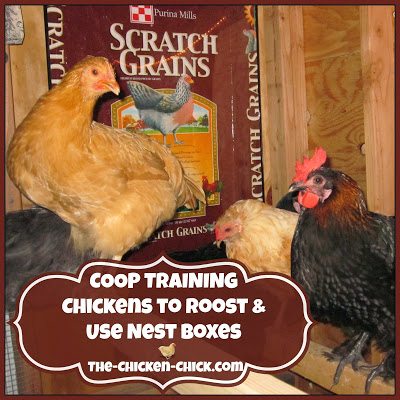
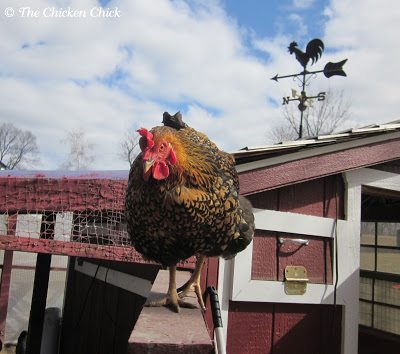
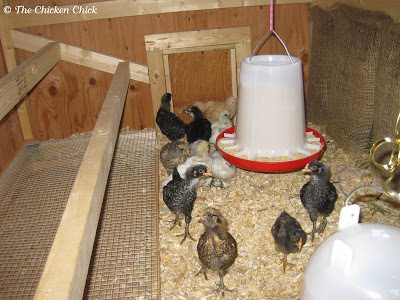

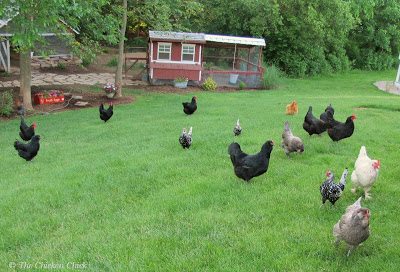
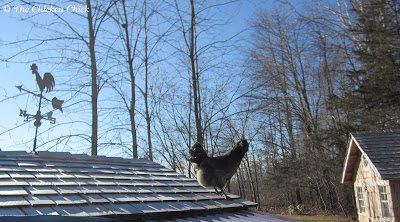
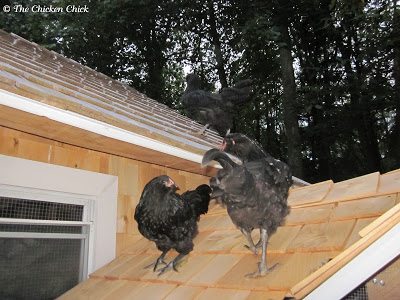
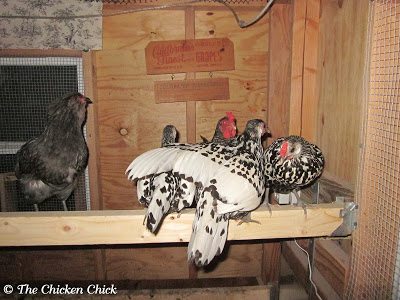


























My hens are sleeping in their nests and there is poop in them every morning. There are also usually a few eggs first thing in the morning, so I am reluctant to close off the nesting boxes at night. Do you have any suggestions?
Close off the nest boxes in the afternoon after the hens have laid their eggs and wake up earlier to open up the nest boxes.
I have 2 sets of hens; one group is 4 months old and the other about 7 weeks. We kept them in the coops for about a week and they return at night but they refuse to roost on their boards at night. Every night we are out there putting them on the boards. Is there any way to encourage them to get up at night? This is getting old! We have never had this problem before! Thanks for any help.
That is completely normal and expected. You’re going to need to keep putting them on the roosts until they are comfortable next to the older birds.
“The second group of chickens were stressed by the move from brooder to coop as is to be expected. The newbies were also disoriented by their new home and the less-than-welcoming existing residents. The newbies did not have the benefit of being confined to the safety of their new home as the first group did. ”
–How would you recommend training the newbies via coop training when the older girls are using it? Close the door during the day so the older gals are out while confining the younger ones for a week?
Thank you! Love your book.
You really can’t close the newbies in the coop because the older girls need to lay eggs. It’s much trickier with additions to an existing flock. You just have to try what works for you- sometimes that means picking up younger birds from the ramp and placing them on the roosts inside the coop for a week or so until they comply with the program voluntarily.
I have 16, 8 week old hens. A friend wants to get rid of 6 adult hens. I am considering taking them, but am worried about my girls. They seem big enough to hold their own, but what advice do you have for this adventure? My girls are not yet free ranging, but are using their coop and run properly! ;)
I do not recommend bringing adult birds into an existing flock. Even if they look healthy, they can share diseases they are immune to with your flock and vice versa. It’s a super risky proposition even if they were to be quarantined properly.
Any suggestions to coop training when it is too hot to use the shut-in method?
You just have to wait until temperatures are cooler.
Yes I would like an answer to this to as we are entering summer and warmer days. We will be moving the flock into a new chicken shed in a few weeks. Do you have any advice if the temperature is over 70 in the coop during the day on how to handle this?
You have to wait until the weather is cooler. There is no ideal alternative.
My chickens are 12 weeks old. I have 7 hens and brought them home as a surprise for my husband. Actually I always wanted chickens since he moved me to his family land. So he just finished building the coop. They were totally out growing the little broader pen, no room to move around. It is around 80 to 85 degrees here in North Alabama. We moved them in today, July 10th. Not another choice. They wouldn’t stay up on the roosts tonight, they are all tucked up in a corner. The coop is 8 feet by 8 feet. We… Read more »
Did you have a roost in their brooder? You’re going to have to place them up on the roost at night after it gets dark out until they begin doing it on their own. Make sure you have roosts in the run during the day too.
Thanks Kathy. Yes we had roosts in the brooder and they used it every night. I thought maybe they were just confused now that there is so much room. Tonight I went in and placed them on the roosts so hopefully they will get the message. There are windows on every side but higher up. The brooder was just hardware cloth easily seen out of. Your book has been a blessing, invaluable. I’m grateful for your blog too because I’m going to need lots of advice! Thanks again.
If you had a roost in the brooder, they’re huddling on the floor because they’re stressed and confused by the move. They should adjust soon enough.
I hope the book helps! Would you mind leaving feedback on Amazon when you have an opportunity? I’d appreciate it! http://amzn.to/2lm8fWo